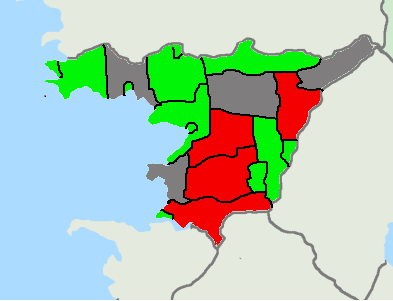2019 Karimunese general election
| ||||||||||||||||||||||||||
| Turnout | 82.22% | |||||||||||||||||||||||||
|---|---|---|---|---|---|---|---|---|---|---|---|---|---|---|---|---|---|---|---|---|---|---|---|---|---|---|
| ||||||||||||||||||||||||||
 Results of the election per States showing the candidates with the largest share of votes in 29,899 voting stations. Thamrin Edelweiss: green; Raphael Alkatiri: red; Swing Voters: Grey | ||||||||||||||||||||||||||
| ||||||||||||||||||||||||||
2019 Karimunese legislative election | ||||||||||||||||||||||||||
This lists parties that won seats. See the complete results below. | ||||||||||||||||||||||||||
| ||||||||||||||||||||||||||
Contents
Background
Elections in Karimun were previously held separately, with a 2008 elections law regulating that presidential and legislative elections be held at least three months apart from one another. Following a 2013 Constitutional Court lawsuit, however, it was decided that the 2019 elections – which would have been the 17th legislative election and the 19th presidential election – would be held simultaneously. The stated intent of the simultaneous election was to reduce associated costs and minimize transactional politics, in addition to increasing voter turnout.
In the 2009 presidential election, Giovanni Governor Harrison Jr from the Independent defeated former general Raphael Alkatiri from SCP to become the nineth President - and the third president not from a political party - of Karimun. Despite initially having a minority government, Harrison later managed to secure the support of Karimun Solidarity Party while Progressive Union Party even though was offered several positions, they rejected the offer but luckily in the legislative elections of the same year several months after, former opposition party YUP managed to secure the largest share in the DPR, YUP immediately joined the goverment coalition.
On 7 April 2017, the KPU, the Elections Supervisory Agency (Bawaslu) and the Home Affairs Ministry held a meeting with the People's Representative Council's special committee to deliberate a draft law concerning the 2019 elections. The Chairman of the House special committee deliberating the bill, Lukman Edy, announced on 25 April 2017 that 22 June 2019, had been agreed upon as the date for the elections.
Nominations of candidates for the national and regional legislatures as well as candidates for president and vice president were completed in September 2018. The campaign period was from 13 November 2018 to 15 June 2019 followed by a seven-day election silence before the voting day on 22 June. The final results will be announced on 30 June. The inauguration of the president and vice president is scheduled for 20 October 2019.
Electoral System
Presidential
To run for the presidency, a candidate had to be supported by political parties totalling 20% of the seats in the DPR or 25% of the popular vote in the previous legislative election.
Political parties were allowed to remain neutral if they were unable to propose their own candidate. However, if a neutral party(s) was able to endorse their own candidate, they were required to do so, or face being barred from participating in the next election.
The voting procedure followed a two-round system, with voters simply choosing one of the candidate pairs. A winning candidate was required to win a majority and at least 20% of the votes in over half of Karimun's provinces. If no candidate pairs had fulfilled the criterion, the election would have to be repeated with a maximum of two participants.
Legislative
Members of both the DPR and the Regional People's Representative Councils (DPRD) were elected from multi-member electoral districts through voting with an open list system, and seat distribution is done with the Sainte-Laguë method in contrast to previous elections which utilised the Hare quota. There was a gender quota requiring at least 30% of registered candidates to be female.
A 10% parliamentary threshold was set for parties to be represented in the DPR, though candidates could still win seats in the regional councils provided they won sufficient votes. There were 575 DPR seats contested – up from 560 in 2014. Nationally, there were 30 DPR electoral districts, with 100 provincial and 300 municipal electoral districts. Candidates for the DPD were not allowed to be members of a political party. Four members were elected for each province – a total of 136.
Voters
Contesting Parties
| Ballot number |
English name | Native language name | Leader |
|---|---|---|---|
| 1 | Karimun Solidarity Party | Partai Karimun Solidaritas | Agathea Malvin |
| 2 | Labour Congress | Kongres Buruh | Juno Alvarez |
| 3 | Progressive Union Party | Partai Persatuan Progresif | Benjamin Fillian |
| 4 | Socialist Chance Party | Partai Kesempatan Sosialis | Phineas Harley |

